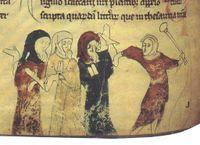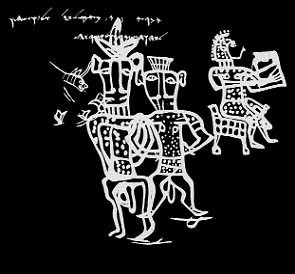Sol is old school frum – doesn’t cover his head at work. But anyone mislead by his bare head does so at his own peril. For this Jew is one crazy frummie boasting incredible emunah (faith). I’ve never witnessed anyone ‘koreh oomishtachaveh’ (bowing and kneeling) like this guy does at minkha, for which, incidentally, he always drafts me and (guilt ridden) I always (reluctantly) attend. You see, as unofficial and unelected corporate shamis (sexton), Sol is required to spend a significant portion of his day working the phone lines, collecting other Jews from around the company and throughout Westchester for his mincha minyan.

This Sol likes bargains. More than once he’s shlepped cans of tuna fish, dozens of them, in plastic bags from the heart of Borough Park to the depths of Midwood (for non-Brooklynites, that’s about three miles).
And why not? If Season’s light tuna fish is 20 cents cheaper at Moishe Pipik’s grocery, who's he to sneeze at the four dollars he'd save for only five hours of his time on Sunday? Law school for his daughter ain't cheap you know.
As we drive through Yonkers on our journey north Sol volunteers that he had enjoyed a particularly pleasant weekend. He seemed, in fact very pleased with himself.
“Why?”
“I was very excited.”
“So what’s so exciting?”
 Very exciting news indeed -- a monster one-day special on Tropicana OJ. How can you beat a half-gallon container of any variety for $1.99? Sol triumphantly describes how he defied ShopRite's strict limit of two containers per customer (only available in any case on purchases of $10 or more). Upon exiting, he simply turned right around and re-entered the supermarket, and repeated this exercise another eight times that Sunday. Each of us and our tiny victories.
Very exciting news indeed -- a monster one-day special on Tropicana OJ. How can you beat a half-gallon container of any variety for $1.99? Sol triumphantly describes how he defied ShopRite's strict limit of two containers per customer (only available in any case on purchases of $10 or more). Upon exiting, he simply turned right around and re-entered the supermarket, and repeated this exercise another eight times that Sunday. Each of us and our tiny victories.“Rabbi, what nussach (accent) did the Egyptians use?”
“I’m not sure. But I'll look into it.”

On May 2, 1287, England's Jews were arrested en masse. It was second time this happened: nine years earlier the entire Jewish community was thrown in prison on suspicion of ‘clipping the coinage’. Three hundred people were hanged on that occasion. This time however, there simply wasn't enough ‘evidence’ to convict. Nevertheless, the Jews were able to avoid expulsion by paying a ransom of 12,000 pounds of silver.


 brilliant little guy with lively inscrutable little eyes hiding behind thick glasses and a mouth naturally shaped into an impish Mona Lisa smile.
brilliant little guy with lively inscrutable little eyes hiding behind thick glasses and a mouth naturally shaped into an impish Mona Lisa smile. On this day in the life of the Jews...The first Auto de Fe in 1481; The Spanish Inquisition established by Sixtus IV, but it didn't begin in full force until 30 months later, when six men and women were burned publicly in Seville for 'Judaising'. This was the first of about 2,000 such burnings across the Iberian peninsula, the last of which occurred in 1826. In total, 31,912 were burned in person (alive or dead) while another 17,659 were burned in effigy. And in our own day, Jew hate in Spain especially, has been redirected into vicious Israel hate. For as anyone with seychel realizes, Israel is the embodiment of the 'The Jew', since it's not vogue -- not yet -- to be an overt anti semite. Not yet
On this day in the life of the Jews...The first Auto de Fe in 1481; The Spanish Inquisition established by Sixtus IV, but it didn't begin in full force until 30 months later, when six men and women were burned publicly in Seville for 'Judaising'. This was the first of about 2,000 such burnings across the Iberian peninsula, the last of which occurred in 1826. In total, 31,912 were burned in person (alive or dead) while another 17,659 were burned in effigy. And in our own day, Jew hate in Spain especially, has been redirected into vicious Israel hate. For as anyone with seychel realizes, Israel is the embodiment of the 'The Jew', since it's not vogue -- not yet -- to be an overt anti semite. Not yet








